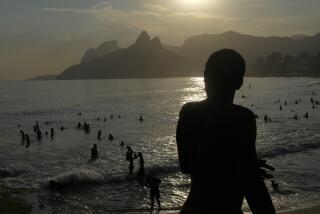Thousands of Myanmar refugees stream into China
An uneasy calm settled over northern Myanmar on Sunday as rebels and refugees continued to cross the border into southern China after an assault by Myanmar’s military.
United Nations and overseas Myanmar groups say more than 10,000 ethnic Kokang refugees, including hundreds of militiamen, are now in southern China, presenting a logistical headache for Beijing.
Still unclear, analysts said, is whether this is only a lull in the fighting and how great an effect this human tide will have on relations between China and its ally, Myanmar, which is also known as Burma.
In the past, Beijing has downplayed political, social and human rights problems raised by the West, arguing that these were internal Myanmar issues that didn’t affect regional stability or China’s national interest. This stance may be harder to maintain now that the problem has washed over into Chinese territory.
“India will remain quiet as long as its national interests aren’t affected,” said Aung Zaw, the editor of the Irrawaddy magazine, based in Chiang Mai, Thailand. “But this puts China in a difficult situation.”
A number of considerations appear to have fueled Myanmar’s decision to launch a campaign against the Kokang militants, analysts said.
“This is a several-prong strategy,” said Zarni, a senior fellow at the London School of Economics and Political Science, who uses only one name.
The move may be aimed at boosting domestic support in advance of promised elections in 2010, the first in two decades. The elections are being held under a new constitution widely seen as favorable to the nation’s military rulers.
Northern Myanmar is better off financially than many other parts of the impoverished nation because of smuggling, Chinese investment, trade and other factors. So an attack on the Kokang, the weakest of several armed groups in the area, could win points among voters farther south who envy the area for its relative prosperity.
The attack on a group that is ethnically and linguistically Chinese also may be a way to send a signal to Beijing that Myanmar doesn’t want to be pushed around.
Although this risks awakening the sleeping giant, Myanmar also knows that China’s Communist Party doesn’t want trouble before the nation’s politically sensitive 60th anniversary of party rule.
Furthermore, China recently staked $1 billion on an oil pipeline project through Myanmar, which will probably make Beijing think twice about applying too much pressure on its neighbor.
With Russia and India either in Myanmar’s camp or unlikely to embarrass it publicly, the government also may be sending out feelers to the United States in a further bid to counterbalance China’s huge influence. This comes at a time when the Obama administration is reviewing U.S. policy toward Myanmar.
This week, Myanmar’s military rulers justified the crackdown against the Kokang forces as a move against drug trafficking -- a cause more likely to win sympathy in Washington -- rather than as an attack on a domestic upstart.
This month, Democratic Sen. Jim Webb of Virginia was given rare access to supreme military leader Senior Gen. Than Shwe as well as detained opposition leader Aung San Suu Kyi.
Webb also was able to secure the release of American John Yettaw, with the military government hailing the senator’s visit as “a success for both sides as well as the first step to the promotion of relations between the two countries.”
Yettaw was jailed on charges related to his visit to Suu Kyi’s house, which he reached by swimming across a lake. Analysts say the incident served as a pretext to extend the Nobel Peace Prize winner’s house arrest by an additional 18 months -- putting Suu Kyi out of circulation through next year’s promised national elections.
Myanmar has been ruled by the military in various forms since a coup in 1962. In the interim, the Southeast Asian nation has held only one election, in 1990. The election produced a landslide win for Suu Kyi’s National League for Democracy, which the government refused to acknowledge. Critics have dismissed next year’s polls as a ruse designed to legitimize and extend the army’s grip on power.
In attacking the Kokang, the government also hoped to send a signal to other armed groups in the area, analysts said, that they should fall in line with its plan to transform them into border guard units and not create trouble.
The government wants various armed groups subdued and on message before the vote and in particular wants to prevent them from unifying politically. Given that the apparent routing of the Kokang took a month, the generals may have given themselves some months before next year’s polls -- no date has been announced -- should they need to take on several other groups one by one.
“For a variety of reasons, they can’t have bombs exploding while the campaign is underway,” Zarni said.
--
More to Read
Start your day right
Sign up for Essential California for news, features and recommendations from the L.A. Times and beyond in your inbox six days a week.
You may occasionally receive promotional content from the Los Angeles Times.






